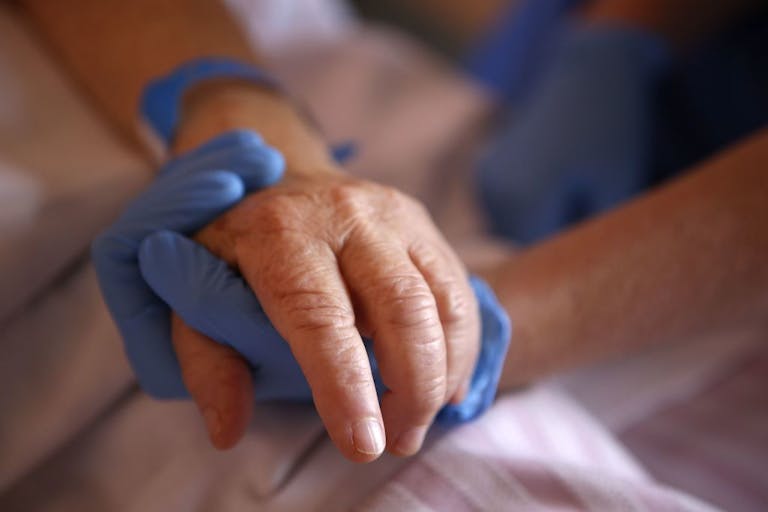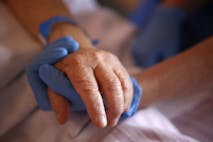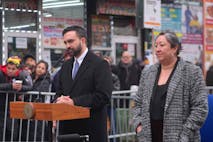
Jersey health leaders say evaluating requests to die may prove impossible
Angeline Tan
·
International·By Nancy Flanders
Second man seeks assisted suicide in Canada due to homelessness
A 37-year-old Canadian man said he will seek out assisted suicide through the nation’s Medical Aid in Dying (MAiD) provisions due to homelessness.
Tyler Dunlop said he sees no benefit in continuing to live, according to OrilliaMatters. He has been homeless on and off for the last 12 years and has become frustrated with his circumstances and the state of society. He recently went to Orillia Soldiers’ Memorial Hospital to begin the process of physician-assisted death, which was originally reserved for individuals facing terminal health conditions.
“I calmly explained it, in my right mind: I wasn’t intoxicated or smoking dope or anything,” Dunlop told OrilliaMatters. “I just said I really think this would be the best decision for me. I’ve researched it. This is an informed decision. I’m not wasting your time.”
Dunlop was previously diagnosed with schizoaffective disorder and post-traumatic stress disorder as the result of childhood trauma that included sexual and physical abuse in the foster care system. Though doctors wanted to admit him for a psychiatric assessment, Dunlop refused. Canada was planning to expand MAiD to include individuals with mental illness this March; however, that plan was delayed following increased scrutiny.
“I refused services to get my point across. I refused shelter, shower, food,” Dunlop said. “They were going to give it to me, but if I did that, they would know that I’m just a homeless guy.”
Dunlop first became homeless in 2010 following his father’s death. At the time, he was working at a used TV shop. In June 2022, he found his roommate and work supervisor deceased in their apartment and the landlord made him move out. He has been living on the streets ever since.
“I’ve worked in all kinds of industries and fields, photography, thrift stores, factories. I’ve always worked,” he said. “I’m a loser, absolutely, but I do work. I do contribute to society on my days off: I get a garbage bag and gloves and I clean up garbage around Orillia.”
Being homeless has reportedly prevented him from keeping a job long-term. “How am I supposed to handle food responsibly when I haven’t bathed in six days or slept?” he asked. “Public safety is at risk there. I’ve got to make the call and be like, ‘OK, I’m sorry. I just can’t do it,’ but I want to work.”
He added that there is “no incentive to keep living and contribute to society at all. I looked at my future and I said, ‘What am I going to be in the next 10 years?’ Same thing: wandering around homeless.”
While Dunlop feels death “really is the only option” he also realizes that “something is deeply wrong” with the system in Canada. He said:
When I first ended up on the street it’s because I was irresponsible. Nowadays … I’m seeing students, professionals. (With) the housing crisis, the people that are homeless really shouldn’t be.
A student trying to pay the rent, he shouldn’t have to be in a shelter, man. There’s honourable people on the streets. I was seeing senior citizens in Halifax when I was there … old people on the street. Why? Couldn’t afford the rent. They’ve never done drugs. They don’t have mental illness. They’re not a drunk.
That’s not OK. Something’s wrong with our government.
Dunlop noted that homeless individuals don’t matter to the Canadian government “because we’re not economically valuable.” He says he has exhausted all of the current resources available to him.
“You want me to get better and contribute to society. Why don’t you make part of disability access to higher education, jobs and skills training for free? Why don’t you give us every option to get off the … system?” he said. “They don’t do that. I want to go to university. I’m a high school dropout, but I love to learn.”
In addition to wanting to further his education, Dunlop said he wants to have a wife and a family, and wants to help others, but without safe, stable housing, he does not see those things as possible.
“If I can help people, well, that’s good enough reason to stay, but I feel useless. That’s why I want to do this: I’m hurting people. I’m hurting myself. I’m hurting society,” he said.
“This isn’t self-pity and self-loathing – I’m seriously using up too much emergency services. Failure is consistent and I’m trying to get out of this hamster wheel, and I can’t do it.”
To move forward with the MAiD application, Dunlop will need two signatures from two different psychiatrists. His first appointment is scheduled for January 31.
Dunlop is the second known homeless Canadian man to apply for MAiD. The first, Amir Farsoud, had applied for Canada’s MAiD but had a change of heart following the outpouring of support and financial assistance he received.
Live Action News is pro-life news and commentary from a pro-life perspective.
Contact editor@liveaction.org for questions, corrections, or if you are seeking permission to reprint any Live Action News content.
Guest Articles: To submit a guest article to Live Action News, email editor@liveaction.org with an attached Word document of 800-1000 words. Please also attach any photos relevant to your submission if applicable. If your submission is accepted for publication, you will be notified within three weeks. Guest articles are not compensated (see our Open License Agreement). Thank you for your interest in Live Action News!

Angeline Tan
·
International
Angeline Tan
·
International
Cassy Cooke
·
Politics
Angeline Tan
·
International
Angeline Tan
·
International
Nancy Flanders
·
Analysis
Nancy Flanders
·
Politics
Nancy Flanders
·
Politics
Nancy Flanders
·
International
Nancy Flanders
·
Activism
Nancy Flanders
·